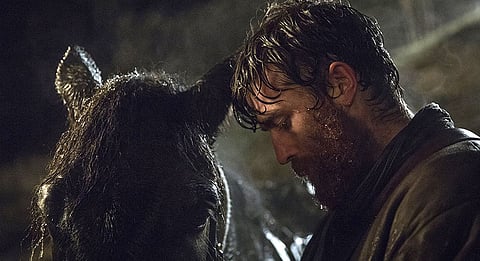
- Reviews
- Power List 2024
- Cannes 2024
- In-Depth Stories
- Web Stories
- News
- FC Lists
- Interviews
- Features
- FC SpecialsFC Specials

Every year, I tell myself to land up at the Berlin International Film Festival a day before the official opening day, because the press screenings of the opening film (Wes Anderson's Isle of Dogs, this year) happen in the morning, and the later screenings get sold out very quickly. The Berlinale takes its commitment to the public (the general audience, not those covering the festival or in the market, screening and buying films) very seriously, and these later screenings are open to all. This year, too, I landed late afternoon and missed Isle of Dogs, like I missed Hail, Caesar! a couple of years ago. Damn! To make matters worse, I've come down with a runny nose, and the woman in the next seat at the Black 47 screening turned to me, mid-movie, and said, "Do you have a handkerchief? Can you blow your nose? It's really irritating." Well, look at the bright side. It can only get better, right?
***
The next press screening was for Black 47, directed by Lance Daly, and set during the Great Famine that ravaged Ireland for two long years. The protagonist is Martin (James Frecheville), an Irish Ranger who has been fighting for the British Army abroad, and has now deserted his post to return to his family. The horrors that lie ahead are crystallised in a knockout visual: Martin's black steed ambles into the frame, as we see a half-submerged skull in an icy puddle. You may say the visual makes its point a little too… pointedly, and that this sort of Symbolism is no longer "cool." But it works because the film is itself old-fashioned, not just in the Western sense but in terms of Indian cinema, specifically Tamil cinema.
Black 47 is essentially what we have come to know as The Shankar Film, with a vigilante hero who avenges the wrongs done unto him through a series of creative killings, and finds himself being followed by a man of the law (Hannah, played by Hugo Weaving with a disorienting burr). Consider the killings. The man who hoarded grain is found buried in a mountain of wheat. The judge who sentenced Martin's brother to hang is found dead on a noose. Heck, it's Indian all over again. Consider the "mass" dialogue too: "If I kill a man, they call it murder. If they do it, they call it war." The only twist is that Shankar saves his "explanation" for a flashback in the second half, while Daly gives us the motive right away.
I think I am saying that I prefer Shankar's version. The setting may make Black 47 seem new (and indeed, the outstanding cinematography, with its bleached-out palette, makes you feel the chill, even in this theatre with heating), but the narrative trajectory, the psychology of the characters, it's all the same. Black 47 is definitely better cinema than the films Shankar makes, but these archetypal narratives need some juice, and Daly directs this revenge drama with a solemnity that suggests this is the very first time such events are being shown on screen. The effect is deadening. I'm not going as far as to suggest the incorporation of lavish song-and-dance sequences, but Black 47 makes the strong case that pulp kicks are not to be underrated. Let's see what Day 2 has in store.